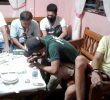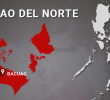DAVAO CITY – An organization of tribal communities on Wednesday scored on the Aquino administration over “the escalating deaths and displacements of Lumads in the country because of large-scale mining projects, and of the implementation of counter insurgency program Oplan Bayanihan”.
The tribal organization, Kalipunan ng mga Katutubong Mamamayan ng Pilipinas (KAMP), claimed that indigenous peoples “are not spared of government brutality” over issues of extrajudicial killings, saying that “44 indigenous peoples have been killed by state forces since 2010”.
Piya Macliing Malayao, spokesperson of KAMP, told Davao Today that tribal communities have their ancestral lands “forcibly grabbed through intimidation, harassments and threats due to sham development large-scale mining projects”.
Mlalayao said tribal communities lose 11 residents annually to killings allegedly done by government forces. “These are brutal killings of indigenous men, women, and children from indigenous communities all over the Philippines.”
Malayao cited the “Capion Massacre” where a B’laan family brutally was killed on October 18, 2012, in Kiblawan, Davao del Sur by soldiers of the 27th Infantry Battalion. The Mindanao Alliance of Indigenous Peoples and Kusog sa Katawhang Lumad sa Mindanao (KALUMARAN) noted that the massacre “was intentional and not a result of an encounter as claimed by the Philippine army.”
The case remained pending in the court and witnesses and survivors refused to appear in a subsequent court martial due to fear of reprisal.
“Oplan Bayanihan, besides racking up the countryside to rid of insurgency, goes in tandem with the administration’s economic program. It is also designed to quell the people’s defiance of business interests and suppress the legal mass movement that demands meaningful reform and social change,” Malayao stressed.
According to KAMP, the Capions lived in the site of the $5.9-billion Tampakan gold-copper project of the Sagittarius Mines, Inc. (SMI.) The mining project was vigorously resisted by the B’laan tribe for several years, which lost other leaders and members along the way, including the Capions.
“Aquino has no intention to end the killings in the Tampakan mine site. Instead, he emboldens mining corporations to exact human rights abuses against indigenous peoples by assurances of protection for their mining interests by the AFP, and even warranted mining corporations the use of paramilitary groups to secure their business,” Malayao said.
In a 2013 written report by the Europe-Third World Centre (CETIM) and Franciscans International submitted to the United Nation Human Rights Council (UNHRC), it noted that “In all cases, military elements of Task Force KITACO were accused by survivors, and witnesses were named as perpetrators.”
Task Force KITACO is a composite group of police, military and government militia.
Malayao also recounted the massacre of the members of the Ligiw family of the Binongan tribe in Baay-Licuan, Abra. “Seventy-three-year-old AmaLicuben Ligiw, and his sons, Freddie and Eddie Ligiw, were killed in a massacre described as one of the worst in recent Cordillera history.
“The three went missing on March 3, 2014 and were found three days later buried in a shallow grave, piled on top of the other. Their bodies showed signs of torture, and were bound at the hands by thick nylon ropes, their mouths gagged. There was evidence that the three were dragged to their graves.”
The Ligiw family, KAMP said, “was active in KASTAN (Kakailian Salakniban Tay Amin ti Nagtaudan) and [the slain members] were vocal critics of militarization and encampment of government troops in their community. Surviving members of the Ligiw family point to the military for the killings”.
KAMP said Baay-Licuan and nearby villages are highly militarized areas. “The Ligiw family may be the best example of how civilians fare in the warpath of Oplan Bayanihan. The counter-insurgency scheme victimizes unarmed civilians, especially those critical of the government.”
“Not only does the Aquino administration violate indigenous peoples’ collective rights to land and resources, but expressly violate their individual civil and political rights. For four years and it has done nothing to give justice to IP victims of human rights violations, or even to show the least respect for indigenous peoples’ rights,” Malayao added. (davaotoday.com)










